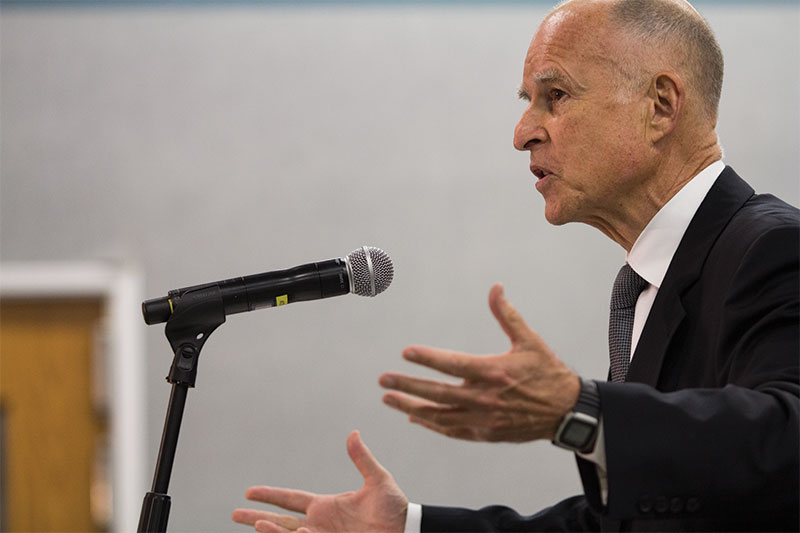
California made transgender rights history on Aug. 12 when Gov. Jerry Brown signed into state law AB1266, a bill aimed to protect certain rights for transgender students from kindergarten to 12th grade.
The bill allows transgender students to use the restrooms and locker rooms of the gender with which they identify, as well as playing on either boys’ or girls’ sports teams.
There are some things that need to be understood about the bill, said Dr. Jenelle Gilbert, graduate program coordinator for the kinesiology department at Fresno State.
“Transgendered individuals are born one gender, but identify with another,” said Gilbert, who also teaches a graduate course on the sociology of sports.
Psychology professor Jennifer Isom, whose background is in neuropsychology and biological psychology, added to Gilbert’s definition.
“Research strongly supports the idea that one’s gender identity is not always the same as one’s genetic sex,” Isom said. “This is largely determined before birth by exposure to prenatal testosterone and estrogen during a critical period of development.”
This means that transsexuals are not, in fact, choosing to identify with the opposite gender, she said. Those individuals whose gender identity, referring to male or female, differs from their genetic sex, which refers to the XX or XY chromosomes, feel discomfort and inner turmoil — sometimes to an extreme — when they are forced to conform to standards set by society.
Gilbert referenced sports sociologist Dr. Jay Coakley, who has discussed a two-category classification model that identifies sex and defines gender in modern culture.
The model presents the idea that heterosexual males who are masculine and heterosexual women who are feminine are considered the norm. It means that homosexuals, bisexuals and transsexuals are considered out of those normative bounds.
Coakley said that this type of thinking causes a distorted view of gays, lesbians, bisexuals and transsexuals as something to fear.
Gilbert said society’s use of the two-category classification model poses an issue for most transgendered individuals because they feel forced to identify with their initial gender and downplay what they feel is their true identity.
She explained that if an individual is born male, but identifies as a female, that individual would behave like a male to fit in. For many in this situation, there comes a time where he will no longer be able to act as a male because he truly identifies as a female, despite living in a man’s body.
“As soon as this realization occurs and an individual acknowledges the gender that he or she most strongly identifies with, then a shift needs to occur,” Gilbert said.
Gilbert said that regardless of whether an individual has undergone gender reassignment surgery, if that person identifies herself as a man instead of a female or vice versa, those people should be treated as the gender with which they identify.
While bathrooms might not pose as much of an issue in regards to the policy because of the use of stalls that allow some measure of privacy, Gilbert said that locker rooms may prove to be a challenge.
This is because locker rooms are a place where individuals are getting undressed and showering in an open space at the same time, Gilbert explained.
Though it is correct for the transgendered individual to use the locker room of the gender that he or she identifies with, this may be uncomfortable for all involved, she said.
“More specifically, the male who identifies as female may still look like a male to the other females, which may prove to be uncomfortable for everyone,” Gilbert said.
Both Isom and Gilbert acknowledged the backlash and criticism of this policy, as did Carlos Alcala, the spokesman for AB1266.
The transgender students generally are trying to blend in and not call attention to themselves, Alcala told Verdin.
“They’re not interested in going into bathrooms and flaunting their physiology,” he said.
Supporters of the bill believe it will help reduce bullying and discrimination against transgender students. California law already prohibited discrimination against students based on their gender identity, but this bill is believed to offer further protection to the students and their families.
Isom said there are individuals who may not be prepared for seeing someone with a different genetic sex in the same bathroom or locker room, but she anticipates more acceptance since other California school districts have implemented this policy for years without any reported problems.
Gilbert said she worries about such incidents: “Bullying and physical assaults are not uncommon when there is a lack of empathy and understanding.”
She said that those in leadership roles — such as coaches, athletic directors, teachers, guidance counselors and academic advisers — have a responsibility to protect the rights and basic safety of all within their charge.
“Changing attitudes and becoming not just tolerant, but accepting of others takes time,” Gilbert said.






Dee Omally • Sep 27, 2013 at 10:59 pm
Wow…simple yet brilliant. This is exactly what I say when I comment in the face of those who demonize and criminalize us.